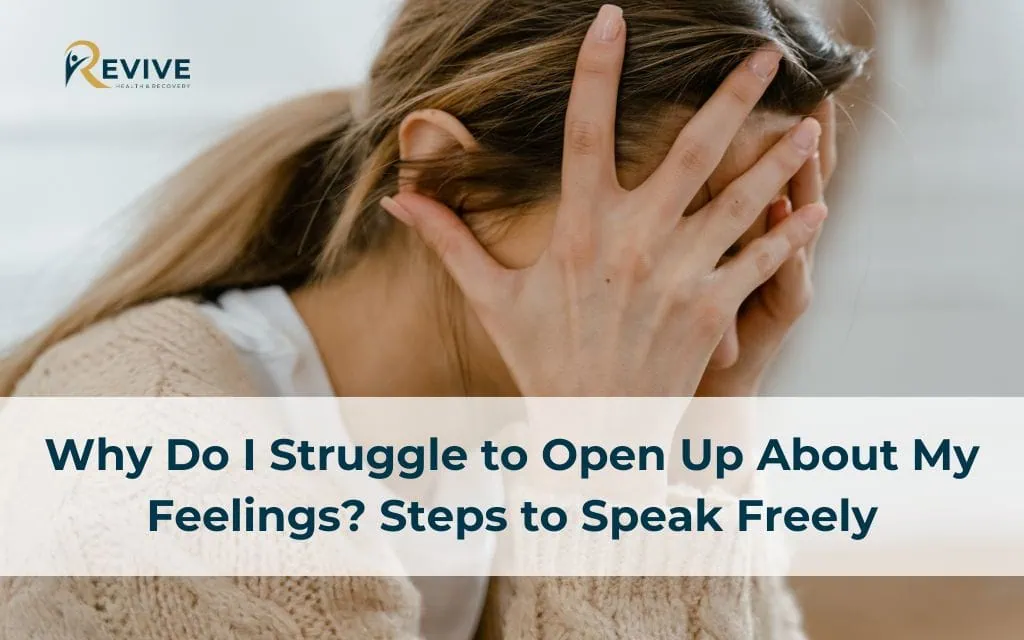The weight of unexpressed emotions can feel crushing. That persistent thought “Why do I struggle to open up about my feelings?” echoes through countless minds, especially in our fast-paced Colorado communities. You’re not walking this path alone.
Research reveals that approximately 10% of the general population faces significant difficulty identifying and expressing emotions, with even higher rates among those experiencing depression or anxiety. Here in Denver, where nearly 30% of adults report symptoms of anxiety or depression, the challenge of emotional expression becomes particularly relevant.
Whether you’ve always found it hard to articulate feelings or noticed this difficulty emerging during stressful periods, understanding why do I struggle to open up about my feelings marks the first step toward change. This exploration examines why emotional expression can feel so challenging and offers practical strategies to help you find your voice.
Understanding the Psychological Barriers to Emotional Expression
The Science Behind Emotional Communication Difficulties
Your brain processes emotions and language in different regions, creating a natural gap between feeling and expressing. The emotional centers that are primarily the limbic system operate much faster than the language areas in your cortex. This biological reality explains why you might feel something intensely but struggle to put it into words.
When clients ask “why do I struggle to open up about my feelings,” we often start by exploring this neurological foundation. Stress compounds this challenge by flooding your system with cortisol, which impairs the connections between emotional and verbal processing centers. When you’re overwhelmed, your brain prioritizes survival over communication, making emotional expression even more difficult.
Some individuals experience alexithymia which is a condition where emotions essentially lack words. People with alexithymia can feel emotions but cannot identify or describe them effectively. This neurological difference often underlies the question why do I struggle to open up about my feelings.
Common Reasons People Struggle to Express Feelings
Fear of vulnerability and rejection often tops the list of barriers to emotional expression. Opening up requires courage because it exposes your inner world to potential judgment or dismissal. Past experiences of having feelings minimized or criticized can create lasting hesitation around emotional sharing.
Cultural and family influences shape how comfortable you feel expressing emotions. Some families or communities discourage emotional expression, particularly for certain genders or in specific contexts. These early messages become internalized beliefs about whether feelings are safe to share.
Many people worry about burdening others with their emotions. This concern, while often well-intentioned, can lead to emotional isolation and increased mental health challenges. The truth is that genuine connections often deepen when people share authentic feelings.

Signs You May Be Struggling With Emotional Expression
Physical Manifestations of Unexpressed Emotions
Your body communicates what words cannot. Tension headaches, tight shoulders, and persistent fatigue often signal unexpressed emotions seeking release. The body holds emotional energy, and without verbal expression, this energy manifests as physical symptoms.
Understanding why do I struggle to open up about my feelings becomes clearer when you recognize these physical signs. Sleep disruptions frequently accompany emotional suppression. When feelings remain unprocessed and unspoken, they can interfere with rest, creating cycles of insomnia or restless sleep that further impact emotional regulation.
Digestive issues, muscle tension, and chronic pain sometimes reflect the body’s attempt to process emotions that haven’t found verbal expression. These somatic symptoms deserve attention as potential indicators of emotional communication difficulties.
Psychological Indicators of Emotional Suppression
Feeling disconnected from your emotional experiences signals potential expression difficulties. You might notice emotions as vague sensations rather than identifiable feelings, making communication about them particularly challenging.
Difficulty identifying what you’re feeling in the moment characterizes many people’s experience with emotional expression problems. This confusion between different emotional states makes it nearly impossible to communicate effectively about feelings, often leading to the question why do I struggle to open up about my feelings.
Emotional numbness alternating with sudden emotional overwhelm creates another pattern common among those struggling with expression. The pendulum swing between feeling nothing and feeling everything intensely reflects disrupted emotional processing.
Impact on relationships and social connections becomes evident when emotional expression difficulties persist. Relationships require emotional communication to deepen and maintain intimacy, making these challenges particularly costly in personal connections.

Breaking Through the Barriers: Strategies for Opening Up
Self-Help Approaches to Improve Emotional Awareness
Mindfulness techniques for identifying feelings start with simple body awareness. Notice where you feel sensations in your body throughout the day. Tension in your jaw might signal frustration, while tightness in your chest could indicate anxiety or sadness.
For those wondering why do I struggle to open up about my feelings, journaling prompts can help explore emotional experiences when words feel elusive. Try writing about your day without censoring, allowing whatever comes up to flow onto the page. Even unclear or fragmented emotional expressions provide valuable insight into your inner experience.
Building an emotional vocabulary expands your capacity for expression. Start with basic emotions: happy, sad, angry, afraid, and gradually add more nuanced terms like disappointed, overwhelmed, or content. The richer your emotional vocabulary, the more precisely you can communicate feelings.
Body-based approaches to reconnect with feelings include progressive muscle relaxation and breathing exercises. These practices help you notice physical sensations associated with different emotions, creating bridges between feeling and awareness.
When and How to Seek Professional Support
Types of therapy effective for emotional expression difficulties include Cognitive Behavioral Therapy, which helps identify thought patterns that interfere with emotional communication. Dialectical Behavior Therapy offers specific skills for emotion regulation and interpersonal effectiveness.
What to expect in therapy for emotional communication involves working with a trained professional who creates safety for exploring difficult feelings. Many clients find that addressing why do I struggle to open up about my feelings becomes easier in therapy’s structured, supportive environment.
Finding the right therapist match in Denver requires considering factors like therapeutic approach, personality fit, and specialization in emotional expression difficulties. The therapeutic relationship itself becomes a laboratory for practicing emotional communication.
Colorado’s mental health resources offer various options for those struggling with emotional expression. From community mental health centers to specialized practices, support exists for developing these crucial skills.
The Role of Safe Relationships in Emotional Expression
Creating Safety for Vulnerable Conversations
Identifying safe people in your life means recognizing those who respond to your emotions with empathy rather than judgment. Safe people validate your feelings even when they don’t understand or agree with them.
Setting boundaries around emotional sharing protects you while you develop expression skills. You might choose to share certain types of feelings with specific people, creating a graduated approach to emotional vulnerability.
Starting small involves gradual steps toward openness rather than diving into deep emotional sharing immediately. For those asking why do I struggle to open up about my feelings, beginning with expressing preferences or mild disappointments before moving to more vulnerable feelings creates manageable progress.
Communicating about communication difficulties helps others understand your challenges. Explaining that you struggle to express feelings can create patience and support for your efforts to open up.
Digital-Age Challenges to Authentic Expression
Social media’s impact on emotional vulnerability often creates pressure to present polished versions of feelings rather than authentic emotional experiences. This curated approach to emotion can interfere with genuine expression skills.
Finding genuine connection in an online world requires intentional effort to move beyond surface-level interactions. Video calls, voice messages, and in-person conversations offer richer opportunities for emotional expression than text-based communication.
Using technology as a bridge to in-person expression can help some people practice emotional communication. Voice recording, video journaling, or texting feelings to trusted friends can serve as stepping stones to face-to-face emotional sharing.
Professional Approaches to Improving Emotional Communication
Therapeutic Modalities for Emotional Expression
- Cognitive Behavioral Therapy techniques focus on identifying and changing thought patterns that interfere with emotional expression. CBT helps you recognize beliefs about emotions that might block communication and develop more helpful perspectives.
- Dialectical Behavior Therapy’s emotion regulation skills teach specific techniques for identifying, understanding, and expressing emotions effectively. DBT provides concrete tools for managing intense emotions while still communicating about them.
- Emotion-Focused Therapy deepens emotional awareness by helping you access and express previously unexpressed feelings. This approach recognizes emotions as valuable information rather than problems to solve, directly addressing why do I struggle to open up about my feelings.
- Mindfulness-based interventions for present-moment feelings teach you to notice emotions as they arise without immediately judging or changing them. This awareness creates space for expression to develop naturally.
Building Long-Term Emotional Intelligence
Developing sustainable emotional awareness practices involves creating daily habits that support emotional recognition and expression. Regular check-ins with yourself about feelings, even brief ones, build emotional intelligence over time.
Creating lasting changes in emotional communication patterns requires patience and practice. Like learning any new skill, emotional expression improves with consistent effort and supportive feedback.
Measuring progress in your emotional expression journey involves noticing small improvements rather than expecting dramatic changes immediately. Celebrating moments when you successfully identify or share a feeling reinforces the development of these skills.

5 Reasons to Choose Revive Health Recovery for Your Emotional Wellness Journey
Specialized Expertise in Emotional Communication
Our therapeutic approaches target emotional expression difficulties specifically, recognizing that difficulty communicating feelings requires specialized attention. Evidence-based treatment methods with proven success guide our work with clients struggling to express emotions.
Professionals trained in trauma-informed care understand that emotional expression difficulties often stem from past experiences that made vulnerability feel unsafe. This specialized training ensures that your healing journey respects your pace and comfort level.
Comprehensive, Personalized Treatment Plans
Individual counseling focused on your unique needs recognizes that emotional expression challenges manifest differently for each person. Your treatment plan addresses your specific barriers while building on your existing strengths.
For clients wondering why do I struggle to open up about my feelings, our outpatient programs that fit your schedule make healing accessible without disrupting your daily life. Flexibility in scheduling supports your commitment to developing emotional communication skills while managing other responsibilities.
Dual diagnosis treatment for co-occurring conditions addresses the reality that emotional expression difficulties often accompany depression, anxiety, or other mental health challenges. Comprehensive care treats the whole person rather than isolated symptoms.
Supportive Community Environment
A safe space for practicing emotional vulnerability provides opportunities to develop expression skills with others who understand your challenges. Group therapy and community connections offer real-world practice in emotional communication.
Connection with others on similar journeys reduces the isolation that often accompanies emotional expression difficulties. Sharing experiences with people who understand creates validation and hope for change.
Our compassionate, non-judgmental approach ensures that your efforts to express emotions receive encouragement rather than criticism. This supportive environment accelerates healing and skill development.
Convenient Denver Location
Easily accessible at 1427 S Federal Blvd, our location serves the Colorado community with local understanding of the unique challenges facing Denver residents. Proximity makes consistent attendance possible, supporting your progress.
Serving the Colorado community means understanding local culture and resources that can support your emotional wellness journey. Our team knows the specific mental health landscape in Denver and can connect you with additional resources when helpful.
Outpatient services that integrate with your daily life and help you through “why do i struggle to open up about my feelings” stage, ensure that the skills you develop in therapy translate to real-world situations. This practical approach makes lasting change more likely.
Commitment to Long-Term Wellness
Focus on sustainable skills development means learning tools you can use independently rather than becoming dependent on ongoing therapy. The goal is to empower you with lasting emotional communication abilities.
Emphasis on practical, real-world application ensures that therapy skills transfer to your relationships, work, and daily interactions. Practice opportunities help solidify new emotional expression patterns.
Continued support throughout your healing journey recognizes that developing emotional expression skills takes time and ongoing encouragement. Our team remains available to support your progress even after formal therapy ends.
Ready to break free from emotional silence? Contact Revive Health Recovery at (303) 268-4655 or email contact@revivehealthrecovery.com. Our compassionate team is available 24/7 to answer your questions and guide you toward the emotional wellness you deserve.
FAQs About Emotional Expression Difficulties
Why do I find it easier to express anger than other emotions?
Anger often feels safer than vulnerable emotions like sadness or fear because it creates a sense of power rather than powerlessness. Cultural and socialization factors make anger more acceptable for some people to express. At Revive Health Recovery, we help you expand your emotional range safely, developing comfort with the full spectrum of human feelings.
Is my difficulty expressing feelings a sign of a mental health condition?
While emotional expression difficulties can accompany conditions like depression or anxiety, they exist on a spectrum and don’t automatically indicate mental illness. Professional evaluation can help determine if underlying conditions contribute to your challenges. Our Denver team specializes in comprehensive assessments that clarify your unique situation and treatment needs.
How can I tell someone I’m close to that I struggle to express my feelings?
Start with simple statements like “I care about you, but I sometimes have trouble finding words for my feelings.” Set realistic expectations by explaining that your emotional communication might develop gradually. Revive Health Recovery offers couples and family therapy to help build mutual understanding about communication differences.
Can medication help with difficulty expressing emotions?
When underlying conditions like depression or anxiety contribute to emotional expression difficulties, medication can help by stabilizing mood and reducing barriers to communication. However, medication works best when combined with therapy that specifically addresses emotional expression skills. Contact Revive Health Recovery at (303) 268-4655 to discuss comprehensive treatment approaches.
How long does therapy for emotional expression typically take to show results?
Most people notice some improvements within 4-8 sessions, though lasting change often takes several months of consistent work. Factors like the severity of difficulties and willingness to practice new skills influence progress. Small signs of improvement include increased emotional awareness and moments of successful expression. Revive Health Recovery provides realistic timelines based on your individual situation during your initial consultation.
Conclusion
Your journey to emotional expression is unique, but you don’t have to walk it alone. If you’ve been asking yourself why do I struggle to open up about my feelings, know that this question itself represents the beginning of positive change. At Revive Health Recovery, we understand the complex challenges of connecting with and communicating your feelings.
Our Denver specialized outpatient services provide the tools, support, and safe environment you need to develop healthier emotional expression patterns. Take the first step toward breaking free from emotional silence today. Contact Revive Health Recovery at (303) 268-4655 or email contact@revivehealthrecovery.com to schedule a consultation. Our compassionate team is available 24/7 to answer your questions and guide you toward the emotional wellness you deserve. Your feelings matter! And with the right support, you can learn to express them.



